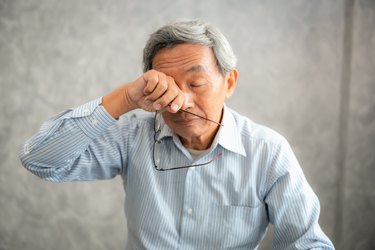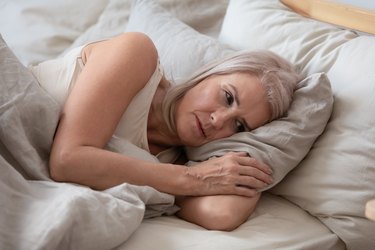
It's not uncommon to tire more easily as you get older. But suddenly feeling wiped out or not having enough energy to get through the day could be a sign of an underlying health concern.
"There are many causes of fatigue that can range from benign to severe and can have sudden onset," says David Cutler, MD, a family medicine physician at Providence Saint Johns Health Center in Santa Monica, California. "While it is normal to experience some fatigue each day, a noticeable change in energy or wakefulness that persists despite taking steps towards rest and self-care may warrant further medical investigation."
Video of the Day
Video of the Day
Here are seven culprits behind sudden excessive sleepiness in older adults, plus what you can do to bring your energy levels back to baseline.
1. You Started a New Medication
Fatigue is a common side effect of many over-the-counter and prescription drugs, including antidepressants, antihistamines, sleep aids, anti-nausea meds, opioids, muscle relaxants and alpha and beta blockers, according to Harvard Health Publishing.
And these effects can become more significant as we get older: "The body's metabolism and fat concentration changes as we age, making older adults more vulnerable to side effects of certain medications based on a drug's mechanism of action," Dr. Cutler says.
2. You're Undergoing a Medical Treatment or Recovering From Surgery
Medical treatments like chemotherapy or radiation can leave you feeling worn out, notes the National Institute on Aging (NIA).
You'll also feel more tired than usual if you're recovering from surgery or a medical procedure, says Ankur Patel, MD, a geriatrician based in Richmond, Virginia, and author of Age Is Just a Number.
Not only is your body expending energy on healing, but you may be given new medications post-surgery that could cause side effects like fatigue.
3. It's an Infection
Illnesses like the flu, pneumonia and urinary tract infections can all make you tired, as your body expends extra energy to fight off the germs, Dr. Patel says. And sometimes these problems can go undiagnosed in older adults.
"Because older adults can have vague symptoms, a patient may not talk to their caregiver or doctors," Dr. Patel adds.
4. You're Anxious or Depressed
Overwhelming emotions can sometimes manifest in physical symptoms like sudden extreme fatigue, according to the NIA, and feelings of depression can become more common with age.
"Older adults may experience loneliness, grief or anxiety about the future, which often goes undiagnosed and may result in fatigue," Dr. Cutler says.
Related Reading
5. You Have a Nutrient Deficiency
Low iron levels, which can occur when a person has iron-deficiency anemia, can leave a person feeling sluggish and weak, notes the Mayo Clinic. So too can failing to get enough vitamin B12 and vitamin D, Dr. Patel says.
While these deficiencies can cause fatigue in people of all ages, older adults are at higher risk of not getting the nutrients they need, per UpToDate.com.
6. You Have Sleep Apnea
Sleep apnea can disrupt a person's breathing while they're sleeping, causing them to wake many times throughout the night without realizing it. This can lead to excessive daytime sleepiness (even after a full night's sleep) along with mood changes, trouble concentrating and waking up with a headache or dry throat, according to the Food and Drug Administration (FDA).
And older adults are at higher risk for the condition: "As a person ages, the muscles weaken, including in the neck and airways," Dr. Patel explains.
This can cause a person's airways to become obstructed during sleep, leading to breathing disruptions.
7. You Have a Chronic Disease
Hormonal imbalances, heart problems, lung conditions, autoimmune disorders and cancer all count fatigue as a symptom, Dr. Cutler says.
If an older adult is sleeping a lot or generally struggling with weakness or low energy and other factors have been ruled out, that could be a sign of a serious underlying health problem (or an underlying health problem that isn't well-controlled).
How to Handle Extreme Fatigue in Older Adults
Sudden or intense fatigue or sleepiness is usually triggered by an underlying health problem.
"Treatment [of the fatigue] usually involves treating the underlying condition that is causing the symptom of fatigue," Dr. Cutler says.
Fatigue caused by a nutrient deficiency, for instance, may improve when a person starts getting adequate amounts of the vitamin or mineral they need.
Fatigue caused by sleep apnea usually resolves with treatment to address a person's breathing disruptions, such as continuous positive airway pressure (CPAP) therapy.
Lifestyle changes can play a supporting role. Regular exercise, especially those that combine balance and breathing (like tai chi or yoga), can give you an energy boost, the NIA says. Limiting daytime naps to 30 minutes can help too, because longer snooze sessions can make it harder to fall asleep at night.
And if you feel too tired to carry out your daily activities, ask for help. Pushing yourself to do it all will only sap your energy further.
When to Call the Doctor
Let your health care provider know if you or an older loved one has been experiencing ongoing fatigue for more than a week or two, the NIA recommends.
Fatigue caused by an underlying problem usually won't go away on its own. Plus, it could cause other unwanted effects like irritability, trouble focusing or headaches and make it harder to do the things you enjoy, Dr. Cutler says.
Is this an emergency? If you are experiencing serious medical symptoms, please see the National Library of Medicine’s list of signs you need emergency medical attention or call 911.


